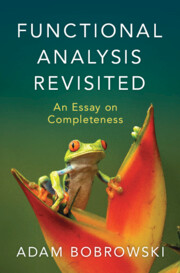
- Publisher:
- Cambridge University Press
- Online publication date:
- October 2024
- Print publication year:
- 2024
- Online ISBN:
- 9781009430883
- Subjects:
- Mathematics, Abstract Analysis

'Functional Analysis Revisited' is not a first course in functional analysis – although it covers the basic notions of functional analysis, it assumes the reader is somewhat acquainted with them. It is by no means a second course either: there are too many deep subjects that are not within scope here. Instead, having the basics under his belt, the author takes the time to carefully think through their fundamental consequences. In particular, the focus is on the notion of completeness and its implications, yet without venturing too far from areas where the description 'elementary' is still valid. The author also looks at some applications, perhaps just outside the core of functional analysis, that are not completely trivial. The aim is to show how functional analysis influences and is influenced by other branches of contemporary mathematics. This is what we mean by 'Functional Analysis Revisited.'
‘This is a remarkable book whose concept is not to present a comprehensive overview of a field but, keeping the geographical metaphor, it follows one of the main rivers there, exploring its tributaries and distributaries and going even beyond the boundaries of the original territory. In this case, the author follows the river of completeness of normed spaces and presents its sources in more fundamental areas of mathematics and its impact on an array of theoretical and applied fields. The book is written in an effortless, casual, yet rigorous style and is a pleasure to read.’
Jacek Banasiak - University of Pretoria
‘This non-standard book can serve as a supplement to an introductory functional analysis course. Centred around the fundamental notion of completeness, it introduces a variety of basic notions and tools, and covers a solid range of material presented in a lively and vivid way. The emphasis has been placed on applications of abstract concepts, including the rudiments of operator semigroups, partial differential equations, and probability theory. The exposition is friendly and fresh, and many insightful comments facilitate digesting the material. Each chapter is accompanied by helpful summaries and carefully selected exercises. The book would be useful for beginners aiming to improve their understanding of the subject, for lecturers willing to refresh their routine courses, and it would be of value to anyone who likes elegant expositions of important mathematical theories.’
Yuri Tomilov - Institute of Mathematics, Polish Academy of Sciences
 Loading metrics...
Loading metrics...
* Views captured on Cambridge Core between #date#. This data will be updated every 24 hours.
Usage data cannot currently be displayed.